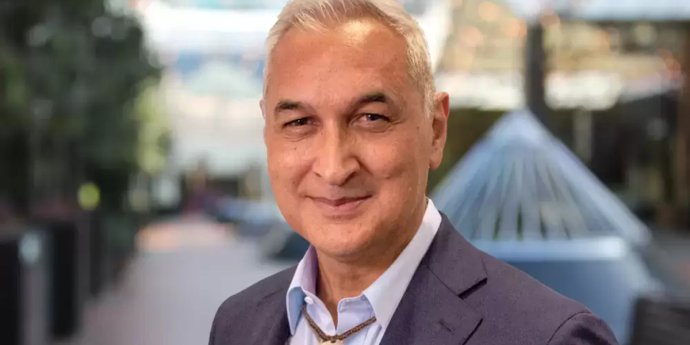
Mike McRoberts: “Allow yourself to go there”

A pathway between Māori businesses and investors will help form authentic partnerships, according to Mike McRoberts. Find out more.
With more than three decades under his belt across radio, long-form documentaries and television, broadcasting heavyweight Mike McRoberts (Ngāti Kahungunu) says it is a gift to connect with New Zealand audiences as NBR’s Te Ao Māori Editor, a role he’s been in since August.
This month he’ll be speaking to directors and the business community at the Institute of Directors’ (IoD) event Te Ōhanga Māori: Connecting with the Māori economy. Much like the role of directorship, McRoberts is also on a path of continuous learning, and as a reminder of what that looks like, he refers to a whakataukī which means: “The mountain of knowledge is a lofty one”.
“So, I kind of wear that and I'll often bring that up because it tells people that I'm still climbing up that mountain,” McRoberts says.
The maunga he’s ascending is learning te reo and gaining a deeper understanding of Te Ao Māori culture, which, for him, has seen a profound internal shift.
The former Newshub presenter made a documentary about his personal journey in Kia Ora, Good Evening which explores his discovery of a culture and language he had very little connection with growing up in Ōtautahi Christchurch. A glimmer of that deep emotion sits beneath the surface as a driver for McRoberts who was only exposed to brief glimpses of Te Ao Māori on trips to his father’s hometown in Wairoa.
With language intimately tied to culture and identity, he is quick to point out that as a country we are still early on a path of learning, which comes with its own challenges.
“I’m kind of looking at it realistically – you have to keep chipping away and expanding people's understanding and knowledge,” he says.
Expanding into fresh territory for NBR, McRoberts has the opportunity to bring Māori business stories into the spotlight.
“Māori businesses are on the cusp of taking off and there's been a growing sense of confidence within our business leaders, and that's huge because you need people to lead – leadership is everything."
“I also feel there's a growing sense of confidence in their own ability and creativity, their own ideas,” says McRoberts, who also believes Māori will be making a significant contribution to other areas in the future, such as science.
“The Māori economy is 77 billion at the moment, and by 2030, will be 100 billion, so obviously it's huge,” he says.
To look at those numbers, directors need not reach for a crystal ball to see into the future. Given too, that over the next two decades 20 per cent of the population will identify as Māori, gives boards a chance to look more closely at how this will inform their strategy, including stakeholder engagement.
But in order for boards to grasp potential opportunities, they will also benefit from engaging effectively with Māori to understand what the future looks like for what this burgeoning economy. The question is, how?
According to McRoberts, there is a knowledge gap that affects the initial stages of forming potential partnerships.
“I was talking to some private capital investors who said they would love to be investing more . . . but they're just not sure about how to give an introduction.”
As an area that needs more attention, he says this could be addressed via a pathway to navigate the introduction process for proposals to submitted. This would benefit both parties and also enable Kiwi businesses to gain more confidence through a deeper understanding of Te Ao Māori, which will assist in building genuine connections.
Interwoven in connection building is storytelling, which has a deep and rich tradition for Māori. Where in the past, Māori were shy in telling their stories, McRoberts says this is changing, but equally, New Zealand and the wider business community could push the envelope further to use storytelling as a way to connect with others. This would also benefit businesses at a time when the economy is tight because storytelling can be used as a tool to reach new audiences.
“The way things are globally, we know we need to be better at telling stories . . . I think it's as much that sense of teaching people things and opening them up to different concepts and ideas as it is about having that cut-through,” McRoberts says of the power of storytelling.
As an enabler of change and connection, he says there are three key ingredients needed for storytelling to be effective and engaging: “Vulnerability, genuineness, and authenticity”.
“They need to be genuine and authentic and that's what people really engage with – those are the things that I think really resonate, particularly in business,” says the former broadcaster who has been responsible for covering major national events and geopolitical issues, including reporting in-situ on conflicts in the Middle East.
Being vulnerable, genuine and authentic – and embodying these traits – will also be useful for directors in forming not only genuine connections with each other, but it will also open the doors to broader diversity and greater resilience.
McRoberts also reinforces the significance of ‘the interconnection of all things’ in Te Ao Māori which contributes to a unique worldview, and feeds into the foundation for community building and wellbeing. It is something that could also translate well into the boardroom.
“You have all these different parts of being Māori, and often you can't move in any direction without all of them being in sync, so sometimes things take a bit longer. But when those things are in sync, that’s when you know the path forward is clear.”
The latter is a leaf from a book that is likely to resonate with boards of directors when considering the long, medium and short term.
“Te Ao Māori is a way of communicating, and I'm not just talking about words, but the actions and things you do,” McRoberts says.
The idea that actions speak loudly is sage advice for directors when faced with the challenge of speaking in te reo Māori whether it be for a karakia or being called to wero. Pushing past the ‘fear of the unknown’ is also important in building a connection to self, and others, and in the case of te reo, McRoberts advice: “Allow yourself to go there.”
“Whether it's a long song, a short one, whether it's a great speech, whether it's an okay speech. Be vulnerable, learn it, perform it. And that vulnerability, and the fact that you've put yourself out there, will say more than anything else.”
Te Ōhanga Māori: Connecting with the Māori economy will be held on 21 November at the Auckland War Memorial Museum. Tickets are available to the public. For more information click here.


